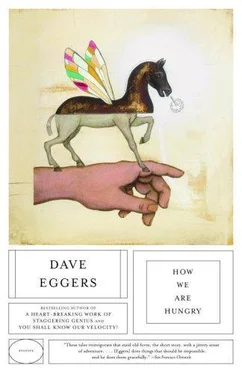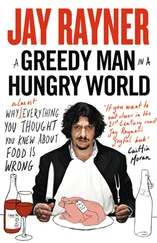Dave Eggers - How We Are Hungry
Здесь есть возможность читать онлайн «Dave Eggers - How We Are Hungry» весь текст электронной книги совершенно бесплатно (целиком полную версию без сокращений). В некоторых случаях можно слушать аудио, скачать через торрент в формате fb2 и присутствует краткое содержание. Год выпуска: 2005, Издательство: Vintage Canada, Жанр: Современная проза, на английском языке. Описание произведения, (предисловие) а так же отзывы посетителей доступны на портале библиотеки ЛибКат.
- Название:How We Are Hungry
- Автор:
- Издательство:Vintage Canada
- Жанр:
- Год:2005
- ISBN:нет данных
- Рейтинг книги:3 / 5. Голосов: 1
-
Избранное:Добавить в избранное
- Отзывы:
-
Ваша оценка:
- 60
- 1
- 2
- 3
- 4
- 5
How We Are Hungry: краткое содержание, описание и аннотация
Предлагаем к чтению аннотацию, описание, краткое содержание или предисловие (зависит от того, что написал сам автор книги «How We Are Hungry»). Если вы не нашли необходимую информацию о книге — напишите в комментариях, мы постараемся отыскать её.
A Heartbreaking Work of Staggering Genius
How We Are Hungry — читать онлайн бесплатно полную книгу (весь текст) целиком
Ниже представлен текст книги, разбитый по страницам. Система сохранения места последней прочитанной страницы, позволяет с удобством читать онлайн бесплатно книгу «How We Are Hungry», без необходимости каждый раз заново искать на чём Вы остановились. Поставьте закладку, и сможете в любой момент перейти на страницу, на которой закончили чтение.
Интервал:
Закладка:
Fifteen porters pass while the paying hikers are eating and changing. One porter, more muscular than the others, who are uniformly thin, is carrying a radio playing American country music. The porter is affecting a nonchalant pride in this music, a certain casual ownership of it. To each porter Grant says jambo and most say jambo in return, eliciting more greetings from Jerry — who now likes to say the word, loudly.
“Jahm-BO!” he roars, in a way that seems intended to frighten.
Shelly steps over to Frank.
“What do the porters eat?” she asks.
“Eat? The porters? Well, they eat what you eat, pretty much,” Frank says, then reaches for Shelly’s hips and pats one. “Maybe without the snacking,” he says, and winks.
There is a boom like a jet plane backfiring. Or artillery fire. Everyone looks up, then down the mountain. No one knows where to look. The porters, farther up the trail but still within view, stop briefly. Rita sees one mime the shooting of a rifle. Then they continue.
Now Rita is walking alone. She has talked to most of the paying hikers and feels caught up. She knows about Shelly’s marriages, her unfinished Ph.D. in philosophy, her son living in a group home in Indiana after going off his medication and using a pizza cutter to threaten the life of a coworker. She knows Jerry, knows that Jerry feels his restaurants bring their communities together, knows that he fashioned them after Greek meeting places more than any contemporary dining model — he wants great ideas to be born over his food — and when he was expanding on the subject, gesturing with a stick he carried for three hours, she feared he would use the word peripatetic, and soon enough he did. She knew she would wince and she did. And she knows that Mike is unwell and is getting sicker and has begun to make jokes about how funny it would be for a designer of ambulances to lie dying on a mountain without any real way of getting to one.
The terrain is varied and Rita is happy; the route seems as if planned by hikers with short attention spans. There has been rainforest, then savannah, then more forest, then forest charred, and now the path cuts through a rocky hillside covered in ice-green groundcover, an ocean floor drained, the boulders everywhere huge and dripping with lichen of a seemingly synthetic orange.
The porters are passing her regularly now, not just the porters from her group but about a hundred more, from the Canadian camp, the German camp, other camps. She passes a tiny Japanese woman sitting on a round rock, flanked by a guide and a porter, waiting.
The porters are laboring more now. On the first day, they seemed almost cavalier, and walked so quickly that now she is surprised to see them straining, plodding and unamused. A small porter, older, approaches her back and she stops to allow him through.
“Jambo,” she says.
“Jambo,” he says.
He is carrying a large duffel with Jerry’s name on it, atop his head, held there with the bag’s thick strap, with cuts across his forehead. Below the strap, perspiration flows down the bridge of his nose.
“Habari?” she says.
“Imara,” he says.
“Water?” she asks. He stops.
She removes her bottle from her backpack holster and holds it out to him. He stops and takes it, smiling. He takes a long drink from the wide mouth of the clear plastic container, and then continues walking.
“Wait!” she says, laughing. He is walking off with the water bottle. “Just a sip,” she says, gesturing to him that she would like the container back. He stops and takes another drink, then hands it to her, bowing his head slightly while wiping his mouth with the back of his hand.
“Thank you,” he says, and continues up the trail.
They have made camp. It’s three in the afternoon and the fog has returned. It hangs lightly over the land, which is brown and wide and bare. The campground looks, with the fog, like a medieval battleground, desolate and ready to host the deaths of men.
Rita sits with Jerry on rocks the size and shape of beanbags while their tents are assembled. Mike is lying on the ground, on his backpack, and he looks to Rita much like what a new corpse would look like. Mike is almost blue, and is breathing in a hollow way that she hasn’t heard before. His walking stick extends from his armpit in a way that looks like he’s been lanced from behind.
“Oh Ashley!” he says to his tapeworm, or whatever it is. “Why are you doing this to me, Ashley?”
Far off into the mist, there is a song being sung. The words seem German, and soon they break apart into laughter. Closer to where she’s sitting, Rita can hear an erratic and small sound, a tocking sound, punctuated periodically by low cheers.
The mist soon lifts and Rita sees Grant, who has already assembled his tent, surrounded by porters. He and a very young man, the youngest and thinnest she’s seen, are playing a tennislike game, using thin wooden paddles to keep a small blue ball in the air. Grant is barefoot and is grinning.
“There he is,” says Jerry. “Saint Grant of the porters!”
At dinner the food is the same — cold noodles, white rice, potatoes, but tonight instead of orange slices there is watermelon, sliced into neat thin triangles, small green boats with red sails on a silver round lake.
“Someone carried a watermelon up,” Mike notes.
No one comments.
“Well, it didn’t fly up,” Frank says.
No one eats the watermelon, because the paying hikers have been instructed to avoid fruit, for fear of malaria in the water. Steven, the porter who serves the meals and whose smile precedes him always, soon returns and takes the watermelon back to the mess tent. He doesn’t say a word.
“What happens to the guy who carried up the watermelon?” Jerry asks, grinning.
“Probably goes down,” Frank says. “A lot of them are going down already — the guys who were carrying food that we’ve eaten. A lot of these guys you’ll see one day and they’re gone.”
“Back to the banana fields,” Jerry says.
Rita has been guessing at why Jerry looks familiar to her, and now she knows. He looks like a man she saw at Target, a portly man trying on robes who liked one so much he wore it around the store for almost an hour — she passed him twice. As with Jerry, she’s both appalled by and in awe of their obliviousness to context, to taste.
The paying hikers talk about their dreams. They are all taking Malarone, an anti-malarial drug that for most fosters disturbing and hallucinatory dreams. Rita’s attention wanes, because she’s never interested in people’s dreams and has had none of her own this trip.
Frank tells a story of a trip he took up Puncak Jaya, tallest peak in Indonesia, a mountain of 16,500 feet and very cold. They were looking for a climber who had died there in 1934, a British explorer who a dozen groups had tried to locate in the decades since. Frank’s group, though, had the benefit of a journal kept by the climber’s partner, recently found a few thousand feet below. Knowing the approximate route the explorer had taken, Frank’s group found the man within fifteen minutes of reaching the correct elevation. “There he is,” one of the climbers had said, without a trace of doubt, because the body was so well preserved that he looked precisely as he did in the last photograph of him. He’d fallen at least two hundred feet; his legs were broken but he had somehow survived, was trying to crawl when he’d frozen.
“And did you bury him?” Shelly asks.
“Bury him?” Frank says, with theatrical confusion. “How the heck we gonna bury the guy? It’s eleven feet of snow there, and rock beneath that—”
“So you what — left him there?”
“Course we left him there! He’s still there today, I bet in the same damned spot.”
Читать дальшеИнтервал:
Закладка:
Похожие книги на «How We Are Hungry»
Представляем Вашему вниманию похожие книги на «How We Are Hungry» списком для выбора. Мы отобрали схожую по названию и смыслу литературу в надежде предоставить читателям больше вариантов отыскать новые, интересные, ещё непрочитанные произведения.
Обсуждение, отзывы о книге «How We Are Hungry» и просто собственные мнения читателей. Оставьте ваши комментарии, напишите, что Вы думаете о произведении, его смысле или главных героях. Укажите что конкретно понравилось, а что нет, и почему Вы так считаете.












